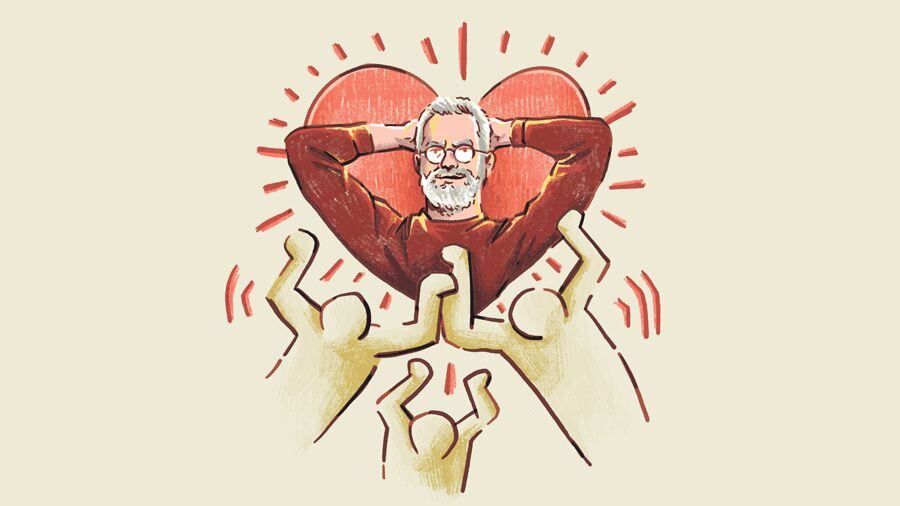June 26 in 2017 was another ordinary summer day. I was 13 and starring in my first-ever show—Toby in Sweeney Todd—and bubbling with excitement about my newfound independence. You see, rehearsals for the show ran Monday-Friday afternoons from 1-5, and given that my parents both worked regular 9-5 jobs, they’d drop me off wherever I wanted to be in town for the morning. That’s how I first explored Santa Fe on my own.
It was fun, even though most mornings consisted of waiting two hours for the mall to open, or just walking around. Still, having this freedom made me feel grown-up, and the morning of June 26 was another one of these days. I asked to be dropped off at the Railyard, but after about 30 minutes of wandering aimlessly, I realized how boring Santa Fe can be on a Monday morning. Even the Violet Crown Cinema didn’t open until 11 am, but just as I’d decided to venture farther downtown, a poster for a film playing at Violet Crown caught my eye: “Falsettos by William Finn: Love can tell a million stories.”
The poster had an interesting design—a family tree in the shape of a heart—and upon closer inspection, I found that the show was gay. Like, incredibly gay. Just like so many other queer youths, I was starved for good representation, and without hesitation, I whipped out my phone and earbuds and looked up Falsettos on YouTube.
A very emotional bus ride later, the show had changed my life.
Falsettos is a musical that follows the story of Marvin, the patriarch of a Jewish-American New York family who leaves his wife and son for a man named Whizzer. Originally conceived as two one-act plays, March of the Falsettos and Falsettoland, each was written nearly a decade apart, and they ultimately merged into one production, which premiered on Broadway in 1992. The version playing at Violet Crown back in 2017 was a 2016 revival from Lincoln Center featuring Christian Borle, Stephanie J. Block and Andrew Rannells among other Broadway legends.
Back on the bus, as the show ended in my earbuds, I disembarked and walked in sheer silence. I was shocked and emotional, stunned by what I’d just heard. I felt real grief from Finn’s musical, and its impact on my life that, from that moment on, felt undeniable. The tunes became earworms immediately, and I spent the summer playing them on a loop. They made me love theater and convinced me to pursue acting. Above all else, for the first time I felt seen and represented. At the time, I identified as a cisgender lesbian, so I didn’t understand why, of all the great queer media I’ve since discovered and consumed, I related to this one piece centering two gay men.
Cut to 2019, when I showed some of my closest friends the Falsettos score. They noticed my undeniable relatability to Marvin and Whizzer rather than the show’s two lesbian characters, Charlotte and Cordelia. In fact, they noticed all the media I liked centered gay male characters. Fast forward further to 2020—the pandemic hit, and so, too, did the brutal realization of my gender identity. I never liked presenting female and always felt discomfort using she/her pronouns. My self expression was always more androgynous, and when I expressed myself with femininity, I needed to add masculine attributes. I purchased a chest binder and started exclusively using they/them pronouns with my friends. This stuck. This felt correct. Finally I felt certain about my gender, even as my sexuality remained a whole other can of worms I simply didn’t want to explore.
Then came this year, and the fantastic opportunity to direct Falsettos as my senior project at New Mexico School for the Arts. By this point, I understood and loved the material so much more than when I first discovered it back in 2017. Upon delving deeper into the show, I made another realization: I am a man. Well, kind of.
I started going by he/they, and things felt even better. Still, some little demon voice in the back of my head kept telling me, “You like men.” I’d always felt detached from my attraction to men. Whenever I felt myself falling for some guy, it was uncomfortable. Looking back now, it was my own discomfort in my gender identity. Now I know: I am a man who likes men, not a woman who likes men. All the pieces fell into place, and being part of a production of Falsettos helped it happen.
My version with Santa Fe’s Youth Collaborative Theater went up June 10, and that night indeed became a core memory. I managed to find the perfect cast, including many of my closest friends, and I got to show my parents, my mentors, my friends and everyone else this piece that so truly reflected who I am. Finn’s show hits so much harder once you relate to it, and it hit me hard.
The joy, heartbreak and catchy songs have been with me for five years, and as I’ve grown in that time, I’ve come to understand so much more. I know I’ll continue to grow and find new things to love about Falsettos; I can’t wait to revisit it 20 years down the line to see what I’ll discover once I’ve lived a time as who I truly am.
Theo Kutsko is a 2022 graduate of New Mexico School for the Arts. They have been in over 30 productions since 2017, and play piano gigs all over Santa Fe, as well as a few in New York City. This fall, Theo will be a freshman at Point Park University in Pittsburgh. Theo was the 2021 recipient of the Melissa Engestrom Youth Award at the Mayor’s Arts Awards.

